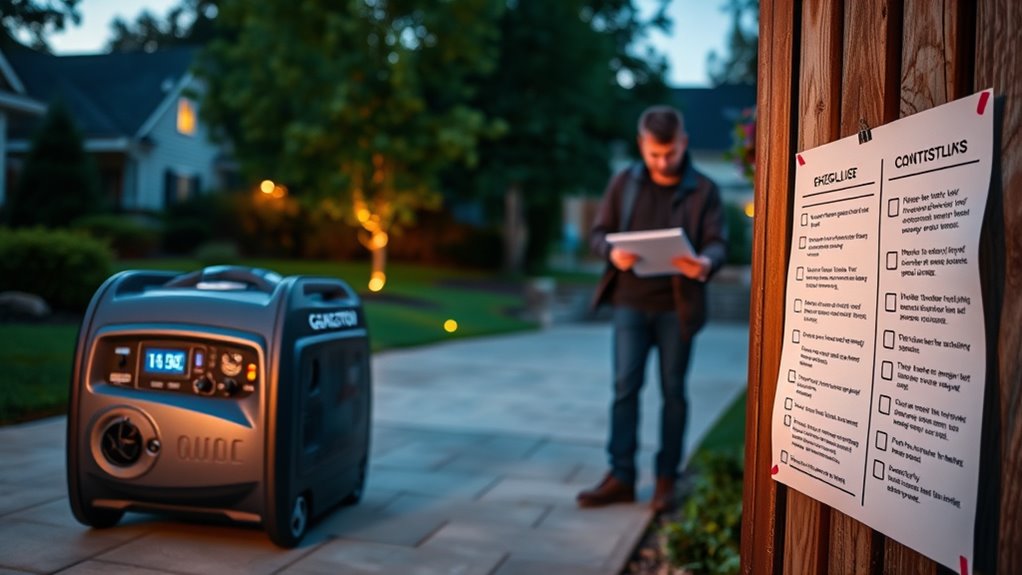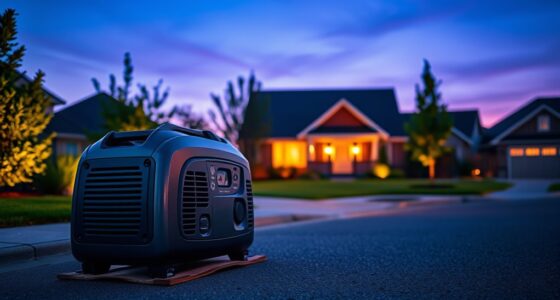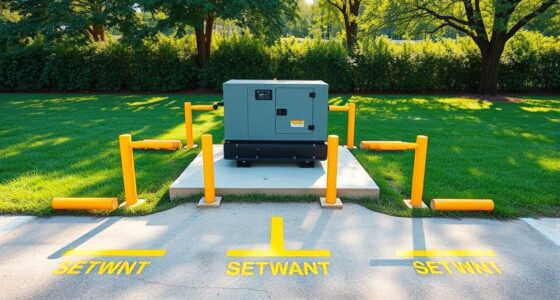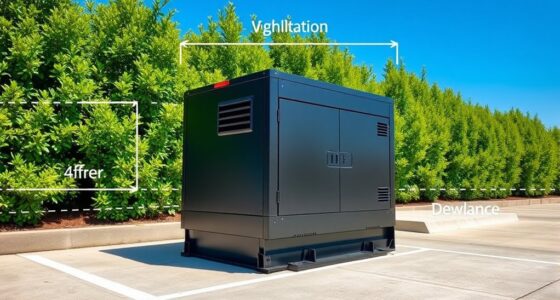Before starting your generator, check your local noise ordinances to make certain you stay compliant. Confirm maximum decibel levels for generator operation, especially during quiet hours, and identify permissible operating times. Select a suitable location away from neighbors’ windows, and consider using sound barriers or mufflers to reduce noise. Regular maintenance also helps avoid excessive sound. Staying informed about these rules now will help you operate responsibly and avoid unnecessary conflicts; keep going to learn more.
Key Takeaways
- Check local noise level limits and permissible hours for generator operation through city or municipality websites.
- Identify recommended or required placement and soundproofing measures to minimize noise disturbance.
- Notify neighbors in advance if you plan prolonged generator use, especially during emergencies.
- Ensure your generator complies with decibel restrictions using appropriate mufflers and regular maintenance.
- Contact local authorities for clarification of regulations and obtain necessary permits if required.
Essential Noise Regulations for Generator Use

When operating a generator, understanding local noise ordinances is vital to avoid fines and community conflicts. Whether you’re preparing for emergencies or running a generator regularly, knowing the legal limits for noise levels helps you stay compliant and avoid unnecessary trouble. Many communities have specific regulations regarding how loud your generator can be, especially during certain hours. Ignoring these rules could not only lead to fines but also disrupt your neighbors and damage your reputation. So, before you fire up your generator, it’s essential to check your local noise ordinances and confirm your setup aligns with legal standards.
Being aware of noise ordinances is a key part of emergency preparedness. In situations like power outages, running your generator might be unavoidable, but you should still aim to operate it in a way that minimizes noise disturbance. This means selecting the right location, such as placing the generator away from windows and neighbor’s property, and using sound barriers or enclosures if allowed. By doing so, you protect your community’s peace while ensuring you’re ready for emergencies. It’s also wise to inform neighbors beforehand, especially if you anticipate prolonged use. This proactive approach fosters good relationships and helps you avoid complaints or conflicts during stressful times.
Operate your generator quietly by choosing a good location and informing neighbors beforehand to maintain community peace.
Legal compliance isn’t just about avoiding penalties; it’s about being a responsible member of your neighborhood. Many jurisdictions specify maximum decibel levels for generators, and these limits often depend on the time of day. For example, daytime noise might be more lenient than nighttime restrictions. To stay within these limits, you can invest in quieter generator models or add mufflers and soundproofing measures. Regular maintenance also keeps noise levels low, preventing your generator from becoming excessively loud due to wear or mechanical issues. Remember, compliance isn’t solely the responsibility of the generator owner—it’s about respecting your community and following the rules that keep everyone comfortable.
Before starting your generator, take the time to review local regulations, whether through city websites, homeowner associations, or local ordinances. Understanding the specific noise limits and acceptable operating hours guarantees you’re prepared and compliant. If you’re unsure about the rules, contact local authorities for clarification. Keeping noise levels in check not only helps you avoid fines but also demonstrates your commitment to being a responsible neighbor. When you prioritize legal compliance and emergency preparedness, you’re better equipped to handle power outages smoothly while maintaining harmony with your community. Remember, a little planning and awareness go a long way in ensuring your generator use remains responsible and respectful. Additionally, researching noise ordinances in your area can provide detailed guidance tailored to your location.
Frequently Asked Questions
Can I Use a Generator During Nighttime Hours?
Yes, you can use your generator during nighttime hours, but you should consider proper generator placement and soundproofing techniques to minimize noise disruption. Position your generator away from neighbors and windows, and use barriers or enclosures to reduce sound levels. These steps help you stay compliant with local noise ordinances while ensuring your generator operates quietly during late hours. Always check specific local regulations before running your generator overnight.
Are There Specific Noise Level Limits for Residential Areas?
Yes, residential areas typically have specific noise level standards you need to follow, often set at around 55 decibels during nighttime hours. In residential quiet zones, you should keep generator noise below these limits to avoid disturbing neighbors. Check your local noise ordinances, as they may vary, and always operate your generator within the permissible noise levels to stay compliant and maintain good neighborly relations.
How Do I Measure if My Generator Complies With Noise Ordinances?
Measuring your generator’s noise compliance is like using a ruler for length—precise and straightforward. You’ll need a decibel meter, a handy sound level measurement equipment, to gauge outdoor noise accurately. Turn on your generator, hold the device at the recommended distance, and note the decibel reading. Compare it to local noise limits. This guarantees your generator stays within acceptable sound levels and avoids any noise ordinance violations.
What Are the Penalties for Violating Noise Regulations?
If you violate noise regulations, you could face legal penalties like fines, citations, or even court action. Your local authorities likely have noise complaint procedures, so neighbors can report excessive noise. Ignoring these rules risks escalating issues and costly penalties. To avoid this, stay compliant by understanding your area’s noise ordinances, measure your generator’s noise levels, and address complaints promptly. Staying informed helps you prevent legal trouble and maintain good neighbor relations.
Do Noise Ordinances Differ Between Urban and Rural Locations?
Yes, noise ordinances often differ between urban and rural areas. Urban zones typically have stricter regulations due to higher population density, including zoning restrictions and lower permissible noise levels. Rural areas might offer noise exemptions or relaxed restrictions, recognizing the different environmental and community needs. You should check local laws because these regulations vary widely, and understanding zoning restrictions helps you stay compliant and avoid penalties.
Conclusion
By following these noise ordinances, you’re not just obeying the law—you’re respecting your neighbors and creating harmony in your community. Think of these regulations as the silent symphony that keeps everyone’s peace intact. When you operate your generator responsibly, you turn a potential discord into a harmonious melody. So, keep these guidelines in mind, and let your responsible use be the quiet note that echoes goodwill and neighborly respect.









